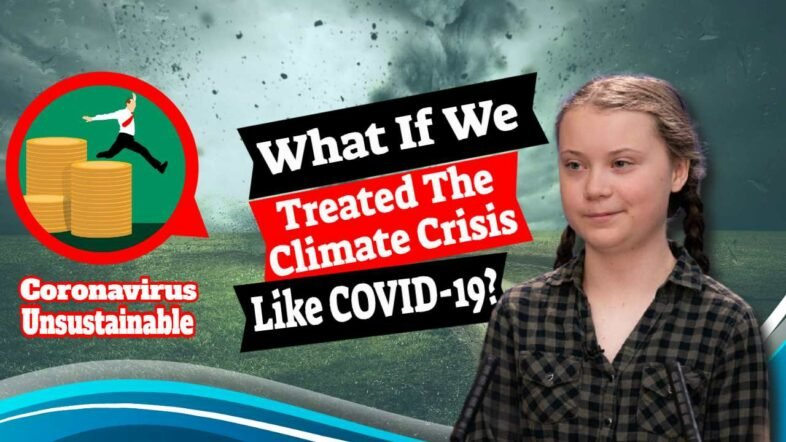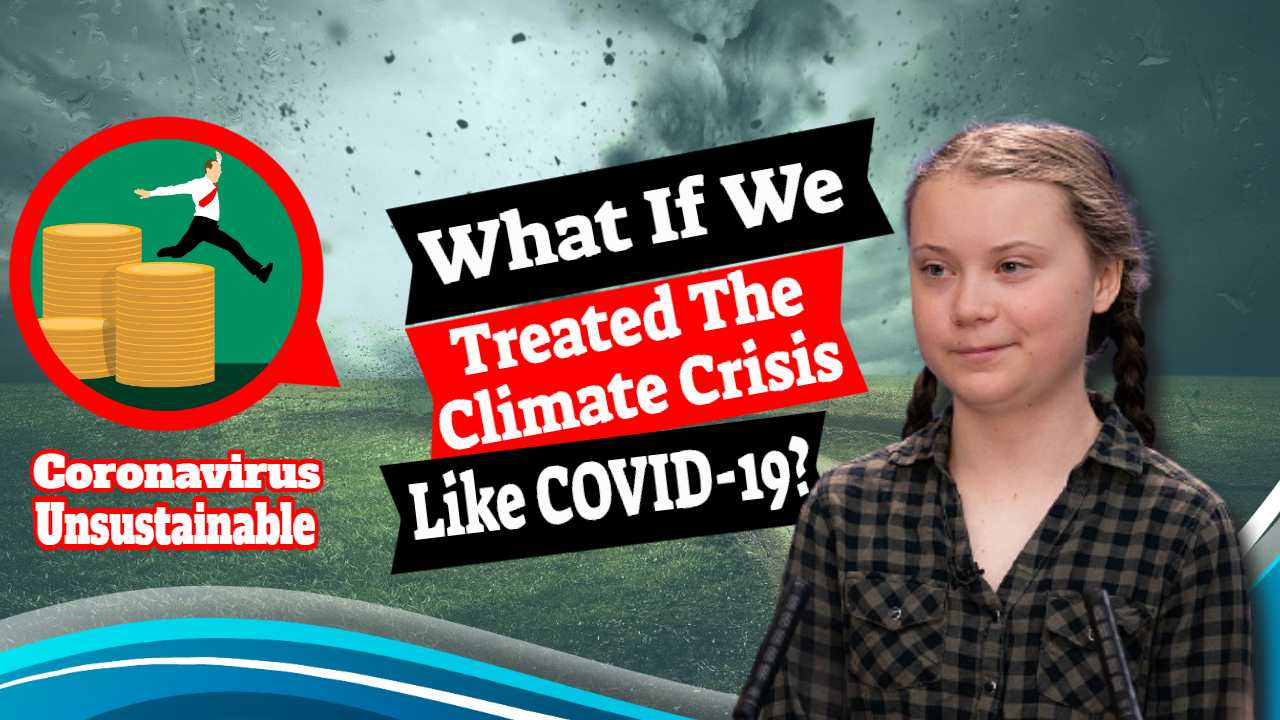Greta Thunberg has a good point when she asks, “What If We Treated The Climate Crisis Like COVID-19?”
One benefit of lockdown, brought about by the coronavirus pandemic has been a period of slight recovery for the environment. many cities have seen an air quality improvement and carbon dioxide levels below the previous high norms. Where human activity has been reduced in parks and wild places, animals have been slowly returning to their natural habitats. It seems that in this terrible time, we have unwittingly moved back a little toward sustainability.
But Greta Thunberg and climate scientist Johan Rockströmin in a conversation hosted by the Nobel Prize Museum, described how COVID-19 has only made the need for immediate action to combat climate change even more apparent.
“Emissions reducing during the corona crisis is not a good thing,” Thunberg said. “You cannot say this is optimistic or that this a good thing that comes out of this pandemic because it’s a pandemic. It’s a tragedy. You cannot see it like that.”
The World Meteorological Organization reported that this year the Earth would experience its largest drop in carbon dioxide emissions since World War II — 6%. However, a statement they put out for Earth Day reiterates Thunberg's message that the environmental impact of this health crisis is not a cure-all for climate change.
“COVID-19 may result in a temporary reduction in greenhouse gas emissions, but it is not a substitute for sustained climate action,”
the WMO said, as reported by Reuters.
Both the WMO and Thunberg pointed out that this isn't a quick fix, and any long-term solution isn't going to happen as the consequence of trying to combat another crisis.
“We need to be able to tackle two crises at once,”
she said. The UN Secretary-General has laid out six goals for post-pandemic recovery to help the environment, according to The Guardian.
The biggest lesson to take away from the coronavirus is that it should have shown us is that climate change reduction and achieving Net-Zero 2050 (as the world's nations declared to achieve in the Paris Accord 2015), would be perfectly possible – if treated as important as saving lives during this pandemic has been treated.
Even beyond its physical effects, the pandemic and tackling it relates to how governments and society are capable of responding in times of crisis.
The amount of discipline and resources that people across the world people have shown willing to contribute during the pandemic has been enormous, Thunberg commented. Rockström noted this to be an important reflection on the present situation.
“When we are not absolutely certain, you have to back off and you have to be careful and you have to reduce risk. That’s exactly what the climate crisis is about,” Rockström said.
Thunberg said the immediacy of action surrounding the coronavirus, and not the environment, boils down to something very crucial:
“The climate crisis has never been treated as a crisis. It has never been communicated as a crisis.”
She went on to say,
“Even if it may not be as immediate as corona, it will still impact ourselves and other people in other parts of the world.”
via Bust.com [we are unable to add the link here as the link breaks our template!]
She went on to talk about how the world will be changed after this pandemic. As for what that means for the environment, Thunberg hopes for a shift in perspective in how people should come together to face, address, and resolve global problems.
“If there’s one thing the coronavirus shows, it’s our society as it is now is not sustainable, in any way, no matter how you define the word sustainable,”
she said.
“If one single virus can destroy economies in a number of weeks, then it shows that we’re not thinking long term, we are not taking these risks into account and that we are not resilient.”
Throughout this crisis, officials have given many changing dates about how long they anticipate the stay-at-home orders, or even pandemic, might last. In relation to climate, Greta said this is very difficult.
“There is a big uncertainty. We can’t just have a magic date or number like this is when the world will end,”
she said. However, prior to the pandemic, scientists designated 2020 as a “super year” which can make or break how the extent to which climate change impacts the environment for years to come.
She ended the talk by saying that although protests in public aren’t possible right now, it’s still possible to be an advocate online. Right now is perfect to use the surplus time to inform yourself on the facts and figures of climate change (NPR put together this great list of resources) so that once we do emerge from this pandemic, we can hit the ground running on saving our Earth.
As the pandemic goes on, Thunberg hopes people take away at least this about how this situation affects the environment and our perception toward saving it.
“It’s always important and essential we listen to science and the experts, but during a crisis, it is even more important that we listen to scientists, science and to the experts. That goes for all crises, whether it’s the corona crisis or it’s the climate crisis, which of course is still ongoing. It’s not slowing down even in times like these,”
she said.
Watch Thunberg’s full talk here.
Featured image cut-out: European Parliament from EU, CC BY 2.0, via Wikimedia Commons


